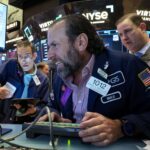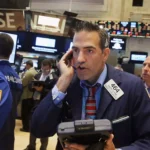Wall Street Cuts S&P 500 Expectations as Geopolitical Risk Rises
As geopolitical tensions escalate with Israel’s war against Hamas, Wall Street strategists are reevaluating their bullish outlook for the S&P 500. The factors that drove optimism, such as a potential Federal Reserve pause, seasonal tailwinds, and earnings-led rallies, are facing challenges as the stock market experiences increased uncertainty.
John Stoltzfus of Oppenheimer & Co., a longtime stock market bull, has revised his year-end forecast for the S&P 500 from 4,900 to 4,400, acknowledging that geopolitical risk and concerns about interest rates may hinder the index’s previous trajectory.

Ed Yardeni, founder of Yardeni Research, previously expected a significant rebound in the S&P 500 after a 10% decline from its July peak. However, he now believes that reaching previous levels is unlikely due to ongoing geopolitical instability and bond market volatility.
While a Santa Claus rally remains a possibility, Wall Street experts are increasingly cautious about market performance before Thanksgiving. The Middle East conflict and concerns in the bond market have contributed to a more pessimistic outlook for the stock market.
This shift in sentiment comes after a wave of optimism that led to upward revisions of US equity forecasts from June through September. Many prominent financial institutions, including Bank of America, Goldman Sachs, and Citigroup, raised their projections during this period.
With just two months remaining in 2023, the S&P 500 is currently about 5% below the average Wall Street year-end target of 4,370. This marks a significant departure from the summer, when the index exceeded the consensus forecast by the largest margin since September 2020.
Investors are facing several key events this week that will impact the market’s direction, including the US Treasury’s borrowing plans, the Federal Reserve’s November rate decision, and corporate earnings from companies like Apple Inc. These developments occur amid an escalating conflict in Gaza, adding to market uncertainty.
Despite recent revisions, some experts remain positive about the overall stock market due to favorable job market conditions, strong corporate earnings, and the Federal Reserve’s cautious approach to rate increases. John Stoltzfus hinted that Wall Street could have an even more optimistic target for the following year.









